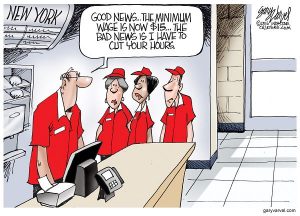
Since the federal minimum wage was set at 25 cents per hour during the Great Depression, Congress has raised it 22 times, the last time to $7.25 in 2009. 29 states plus the District of Columbia have higher mandated wages, with DC, where I live, the highest at $12.50.
There are good arguments on both sides of the minimum wage issue. Republicans and conservatives generally say that raising the minimum wage could reduce jobs and harm businesses. In addition, it’s a federal minimum wage, and states and local jurisdictions already have their own wage laws, so it’s an imposition of federal authority to tell the other jurisdictions that they have to do differently. Democrats and left-leaning individuals generally support raising the minimum wage; at this point we are near “full employment” and there is little evidence that a higher minimum wage would cost jobs. It’s hard to argue that $7.25 per hour is much of a living wage. And if our goal is to put money into the hands of American workers who need it most (after all, isn’t that a big part of the idea of the tax cut?) why shouldn’t we?
This would be a good area for a compromise. $7.25 in 2009 dollars would be $8.41 in 2018. If our minimum wage were indexed for inflation, we wouldn’t have to argue about it each time. As it stands now, Democrats will push for an even higher minimum wage, and they will get it if and when they have control; in fact, it may help them to gain control because it can put money into the hands of voters who want a higher wage. Republicans will continue to argue against all increases because they’ve staked out their territory that a hike is anti-business. That’s just not as compelling when businesses are doing well, getting a big tax cut, and even Wal-Mart is increasing their wages. There isn’t much economics or principle against small increased indexed to inflation, and by blocking minimum wage increases as a matter of principle we’re effectively saying that businesses are more important than employees. It would be good to know that our public policy supports both.
